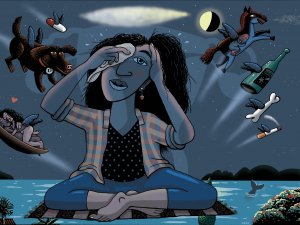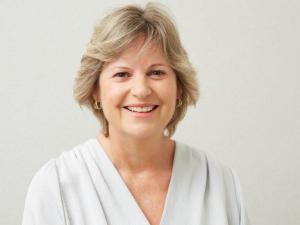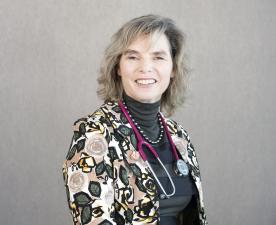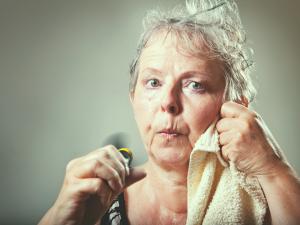Respiratory physician Lutz Beckert considers chronic obstructive pulmonary disease management, including the prevention of COPD, the importance of smoking cessation and pulmonary rehabilitation, and the lifesaving potential of addressing treatable traits. He also discusses the logic of inhaler therapy, moving from single therapy to dual and triple therapy when indicated, as well as other aspects of management
Of menopausal rage and the power of listening
Of menopausal rage and the power of listening

NEWS
New Zealand Doctor Rata Aotearoa reporter Zahra Shahtahmasebi talks to health writer Niki Bezzant about her book on menopause
Sometimes the dots don’t get connected. There’s so much new research all the time
Niki Bezzant knew nothing about menopause until a couple of years ago when she started researching for her new book, This Changes Everything.
The idea came after publisher Penguin Books said it was time New Zealand had an up-to-date guide on menopause. The current guide, by Wellington Menopause Clinic co-founder and specialist GP Beverley Lawton, was first published in 2006.
When Ms Bezzant began the project she was about to turn 50, the “prime territory” for peri-menopause and menopause.
She was astonished by how much there is to know about menopause and by the amount of misinformation.
Using social media, she asked women to share their stories and was amazed at how forthcoming they were in their responses.
After surveying about 300 New Zealand women, she turned to experts, including Professor Lawton, sleep medicine specialist and specialist GP Alex Bartle, and gynaecological endocrinologist Anna Fenton, interviewing them on every aspect of life during menopause.
These aspects are covered in individual chapters, on hormones, sleep, sex and libido, and more.
Ms Bezzant was surprised that many women spoke about rage. “This very unfeminine kind of word, that we don’t often associate with women, that was something that overwhelmed people sometimes.”
Others spoke of brain fog and a loss of confidence.
“Everyone’s experience is different, there is no ‘standard’. There are the classic things of hot flushes, and mood swings, but there is such a wide range of symptoms, which can be distressing or not.”
From the large amount of data she collected, she says she is shocked and upset at how women are dealt with when they try to report their health issues.
Some women with potential menopause symptoms talked to their doctors, only to have their concerns dismissed or not listened to.
“They’re told, ‘oh, we’ll just test your hormones’, ‘you’re too young’, ‘oh, we don’t prescribe hormone replacement therapy, that’s dangerous’ – which is just a completely outdated view.”
Ms Bezzant is a journalist with a passion for women’s health. She is editor of Thrive and health editor of Woman magazines, and was founding editor of Healthy Food Guide.
She sees her book as a resource for doctors: “Sometimes the dots don’t get connected. There’s so much new research all the time – it’s hard to keep up for busy GPs.”
She hopes they will recommend it to patients.
Based on the responses received from women, she encourages health professionals to listen and empathise. Menopause is often seen as part of being a woman, a natural life stage, but it can be challenging.
“Think about all of the symptoms as a whole, ask about her vagina, her sex life. It’s something most women won’t bring up themselves, but they might be uncomfortable or dry during sex, and if this is addressed it can vastly improve quality of life.”
She says in Māori culture, older women are celebrated and honoured, and menopause is seen as a new and powerful time, whereas Western culture frequently makes menopause the subject of jokes.
She also notes the current inequities when it comes to obtaining treatments.
“Some are subsidised, but not all, and if your HRT needs to be tweaked, or you need a different approach, it can be very pricey.”
She would like to see holistic mid-life women’s health clinics that provide screening, skin checks and menopause services.
We've published this article as a FREE READ so it can be read and shared more widely. Please think about supporting us and our journalism – subscribe here








![Barbara Fountain, editor of New Zealand Doctor Rata Aotearoa, and Paul Hutchison, GP and senior medical clinician at Tāmaki Health [Image: Simon Maude]](/sites/default/files/styles/thumbnail_cropped_100/public/2025-03/Barbara%20Fountain%2C%20editor%20of%20New%20Zealand%20Doctor%20Rata%20Aotearoa%2C%20and%20Paul%20Hutchison%2C%20GP%20and%20senior%20medical%20clinician%20at%20T%C4%81maki%20Health%20CR%20Simon%20Maude.jpg?itok=-HbQ1EYA)
![Lori Peters, NP and advanced health improvement practitioner at Mahitahi Hauora, and Jasper Nacilla, NP at The Terrace Medical Centre in Wellington [Image: Simon Maude]](/sites/default/files/styles/thumbnail_cropped_100/public/2025-03/2.%20Lori%20Peters%2C%20NP%20and%20advanced%20HIP%20at%20Mahitahi%20Hauora%2C%20and%20Jasper%20Nacilla%2C%20NP%20at%20The%20Terrace%20Medical%20Centre%20in%20Wellington%20CR%20Simon%20Maude.jpg?itok=sUfbsSF1)
![Ministry of Social Development health and disability coordinator Liz Williams, regional health advisors Mary Mojel and Larah Takarangi, and health and disability coordinators Rebecca Staunton and Myint Than Htut [Image: Simon Maude]](/sites/default/files/styles/thumbnail_cropped_100/public/2025-03/3.%20Ministry%20of%20Social%20Development%27s%20Liz%20Williams%2C%20Mary%20Mojel%2C%20Larah%20Takarangi%2C%20Rebecca%20Staunton%20and%20Myint%20Than%20Htut%20CR%20Simon%20Maude.jpg?itok=9ceOujzC)
![Locum GP Helen Fisher, with Te Kuiti Medical Centre NP Bridget Woodney [Image: Simon Maude]](/sites/default/files/styles/thumbnail_cropped_100/public/2025-03/4.%20Locum%20GP%20Helen%20Fisher%2C%20with%20Te%20Kuiti%20Medical%20Centre%20NP%20Bridget%20Woodney%20CR%20Simon%20Maude.jpg?itok=TJeODetm)
![Ruby Faulkner, GPEP2, with David Small, GPEP3 from The Doctors Greenmeadows in Napier [Image: Simon Maude]](/sites/default/files/styles/thumbnail_cropped_100/public/2025-03/5.%20Ruby%20Faulkner%2C%20GPEP2%2C%20with%20David%20Small%2C%20GPEP3%20from%20The%20Doctors%20Greenmeadows%20in%20Napier%20CR%20Simon%20Maude.jpg?itok=B0u4wsIs)
![Rochelle Langton and Libby Thomas, marketing advisors at the Medical Protection Society [Image: Simon Maude]](/sites/default/files/styles/thumbnail_cropped_100/public/2025-03/6.%20Rochelle%20Langton%20and%20Libby%20Thomas%2C%20marketing%20advisors%20at%20the%20Medical%20Protection%20Society%20CR%20Simon%20Maude.jpg?itok=r52_Cf74)
![Specialist GP Lucy Gibberd, medical advisor at MPS, and Zara Bolam, urgent-care specialist at The Nest Health Centre in Inglewood [Image: Simon Maude]](/sites/default/files/styles/thumbnail_cropped_100/public/2025-03/7.%20Specialist%20GP%20Lucy%20Gibberd%2C%20medical%20advisor%20at%20MPS%2C%20and%20Zara%20Bolam%2C%20urgent-care%20specialist%20at%20The%20Nest%20Health%20Centre%20in%20Inglewood%20CR%20Simon%20Maude.jpg?itok=z8eVoBU3)
![Olivia Blackmore and Trudee Sharp, NPs at Gore Health Centre, and Gaylene Hastie, NP at Queenstown Medical Centre [Image: Simon Maude]](/sites/default/files/styles/thumbnail_cropped_100/public/2025-03/8.%20Olivia%20Blackmore%20and%20Trudee%20Sharp%2C%20NPs%20at%20Gore%20Health%20Centre%2C%20and%20Gaylene%20Hastie%2C%20NP%20at%20Queenstown%20Medical%20Centre%20CR%20Simon%20Maude.jpg?itok=Z6u9d0XH)
![Mary Toloa, specialist GP at Porirua and Union Community Health Service in Wellington, Mara Coler, clinical pharmacist at Tū Ora Compass Health, and Bhavna Mistry, specialist GP at Porirua and Union Community Health Service [Image: Simon Maude]](/sites/default/files/styles/thumbnail_cropped_100/public/2025-03/9.%20Mary%20Toloa%2C%20Porirua%20and%20Union%20Community%20Health%20Service%20in%20Wellington%2C%20Mara%20Coler%2C%20T%C5%AB%20Ora%20Compass%20Health%2C%20and%20Bhavna%20Mistry%2C%20PUCHS%20CR%20Simon%20Maude.jpg?itok=kpChr0cc)